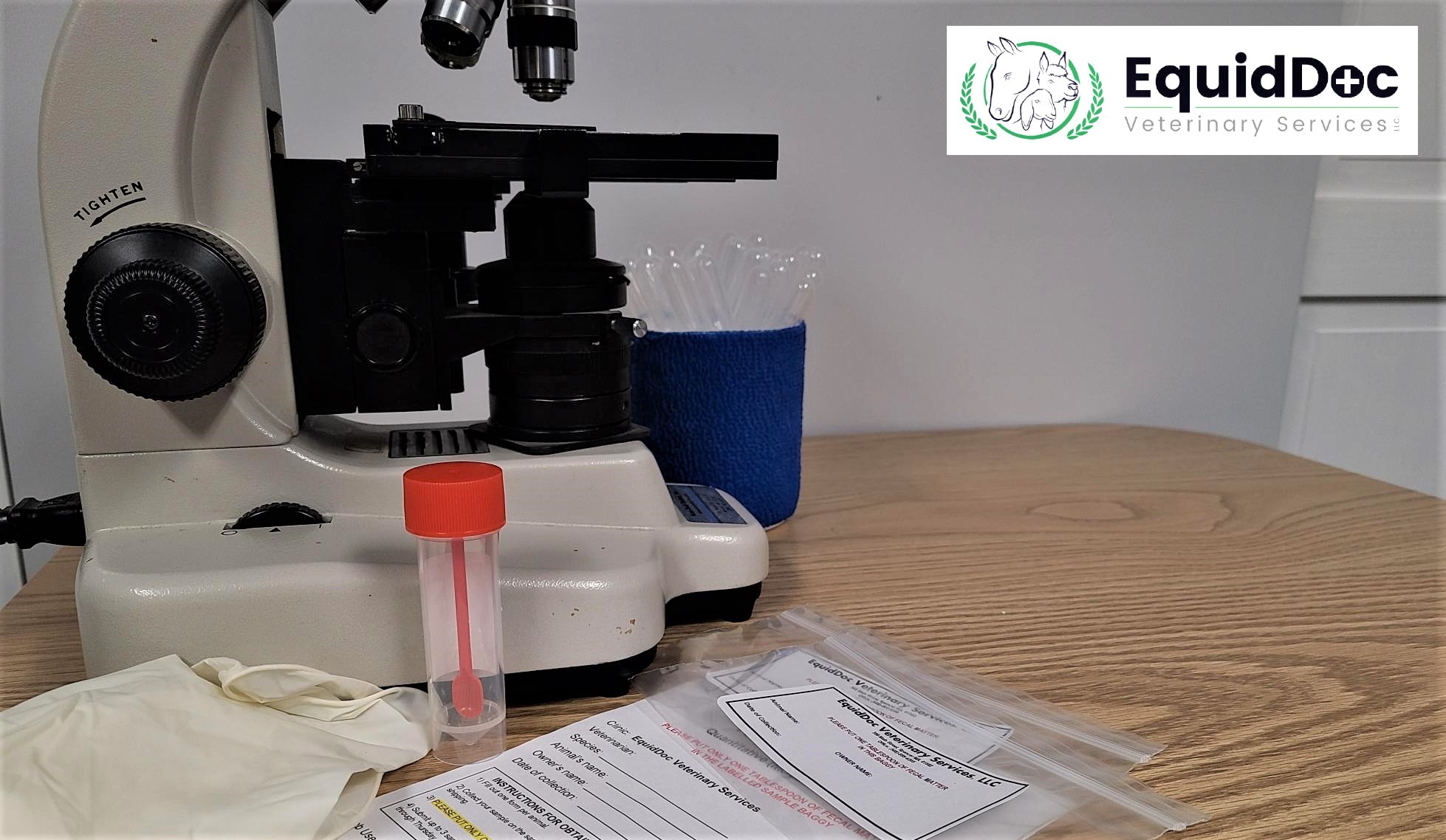The days of rotational deworming every 2-3 months are, and have been, in the rear-view mirror! For several years now, EquidDoc veterinarians have been following updated AAEP guidelines about targeted deworming of individual animals at specific times with specific medications. Each horse is treated as an individual based on their fecal egg count test, age, lifestyle, and any underlying health conditions. Since there is no longer a one-size-fits-all deworming recommendation here’s a review of the important concepts behind our recommendations.
 Though there are many types of parasites around the world that inhabit the gastrointestinal tract of horses, currently there are only a handful of intestinal parasites in North America that cause disease in our horses (and ponies & donkeys). The most common types of parasites that we monitor and treat in adult horses are cyathostomins (or small strongyles), tapeworms, and pinworms. A few small strongyles are usually insignificant, but high worm burdens can cause intestinal inflammation, malabsorptive issues, and weight loss. Uncontrolled tapeworm populations can lead to blockages of the digestive tract (impactions), and pinworms often result in characteristic itching and hair loss around your horse’s tail and rear end. Young horses can be affected by these parasites as well, but the most important parasites in horses less than 3 years old are ascarids (or roundworms). High numbers of roundworms can cause poor growth, impactions, and respiratory disease. These parasites all have different life cycles and may require different types of monitoring, treatment plans, and environmental management.
Though there are many types of parasites around the world that inhabit the gastrointestinal tract of horses, currently there are only a handful of intestinal parasites in North America that cause disease in our horses (and ponies & donkeys). The most common types of parasites that we monitor and treat in adult horses are cyathostomins (or small strongyles), tapeworms, and pinworms. A few small strongyles are usually insignificant, but high worm burdens can cause intestinal inflammation, malabsorptive issues, and weight loss. Uncontrolled tapeworm populations can lead to blockages of the digestive tract (impactions), and pinworms often result in characteristic itching and hair loss around your horse’s tail and rear end. Young horses can be affected by these parasites as well, but the most important parasites in horses less than 3 years old are ascarids (or roundworms). High numbers of roundworms can cause poor growth, impactions, and respiratory disease. These parasites all have different life cycles and may require different types of monitoring, treatment plans, and environmental management.
In combination with annual assessments of body condition and health status, quantitative fecal egg counts performed on manure samples are the best way to stay on top of your horse’s parasite situation. Fecal egg counts are important to identify not only those animals that are negatively affected by large parasite burdens but also those healthy horses that contribute a large portion of the strongyle eggs shed onto pasture. Due to the characteristics of the eggs in manure samples, standard fecal egg counts are most useful for detecting and monitoring quantities of strongyle and ascarid eggs. Tapeworms and pinworms require special diagnostics. Depending on your horse’s lifestyle and history of parasitism, we typically recommend checking fecal egg counts every 6 months. Fecal egg counts also play an important role in determining how well deworming drugs are working. A fecal egg count reduction test (FECRT) is performed using the original fecal egg count and subsequent fecal egg counts collected during specific time frames after deworming.
When it comes to treatment, the theory for modern deworming practices considers a very important factor – anthelmintic drug resistance. The word “anthelmintic” refers to a drug or medication that kills parasites (i.e., dewormer). The term “resistance” in this case refers to the parasite’s ability to adapt and no longer be killed by the dewormer. The reality is we will never be able to completely eradicate internal parasites from horses due to environmental and biological factors (i.e., they walk through manure, walkthrough hay, then eat their hay!). In hindsight, our rotational deworming contributed to creating parasite resistance to our existing deworming drugs. Sadly, there are no new anthelmintic drugs on the horizon, so it is now incredibly important to conserve the effectiveness of the deworming medications we do have. How do we do that? Only deworm your horse when indicated by fecal egg count result and your veterinarian’s recommendation! What do you need to do? Remember to have a fecal performed twice a year, for ease EquidDoc recommends one at your horse’s Spring vaccine appointment and the second at their Fall dentistry and vaccine appointment.
If you have further questions or concerns about equine parasites and deworming, please feel free to email us at office@equiddocvet.com or give the office a call at 508-885-4205. Be sure to collect a manure sample to submit for a fecal egg count at your horse’s spring vaccine appointment, or sooner if you have concerns about an individual horse or herd parasite status!

